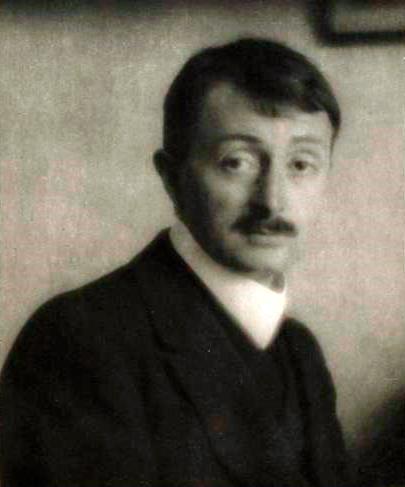Lord, give to men who are old and rougher
The things that little children suffer,
And let keep bright and undefiled
The young years of the little child.
The things that little children suffer,
And let keep bright and undefiled
The young years of the little child.
from 'The Everlasting Mercy'.
John Edward Masefield was born in the Herefordshire market town of Ledbury on the 1st of June, 1878. He was the third child of Edward Masefield, a lawyer in the town, and Caroline Masefield. The family lived in 'The Knapp', a large house but a few fields from the Hereford and Gloucester Canal.
Until the age of six, Masefield's 'young years' were doubtless bright and undefiled. In So Long to Learn, 'fragments of an autobiography', Masefield recalled the intensity of childhood, - which he called 'Paradise' - and an abrupt experience, at the age of about five, of being able suddenly to
As might be expected, Masefield could describe this equally richly in verse:
However, Masefield was soon to know hardship of the cruellest kind. In 1884, his mother died giving birth to her sixth child, Norah: John was only six years of age at the time. A year later both of his Masefield grandparents died. Financial difficulties necessitated a new governess, Mrs Broers, of whom Masefield expressed his opinion by stabbing her with a fork in the arm. All the time the health of his father gradually deteriorated, and he also died in 1890. Masefield was an orphan at the age of 12.
The young family was taken in by Masefield's aunt and uncle, William and Kate Masefield. They had had no children of their own, and Aunt Kate especially was sceptical of John Masefield's interest in literature. Her recommendation was that Masefield be sent to sea in order to quash this literary enthusiasm. So it was that in 1891 Masefield joined the H.M.S. Conway, a naval training ship moored in the Mersey - training that would qualify him not as a sailor, but as the 'sea-poet'.
'...Visible bread grew golden in the sun.
Near timbered barns the red brick farmsteads stood,
Each with an oast house like a Welsh crone's hood;
Each floated over by the shifting flight
Of countless pigeons flashing dark and white...'
Near timbered barns the red brick farmsteads stood,
Each with an oast house like a Welsh crone's hood;
Each floated over by the shifting flight
Of countless pigeons flashing dark and white...'
from 'Wonderings'
Until the age of six, Masefield's 'young years' were doubtless bright and undefiled. In So Long to Learn, 'fragments of an autobiography', Masefield recalled the intensity of childhood, - which he called 'Paradise' - and an abrupt experience, at the age of about five, of being able suddenly to
'... imagine imaginary beings complete in every detail, with every faculty and possession... these imaginations did what I wished for my delight, with an incredible perfection, in a brightness not of this world'.
As might be expected, Masefield could describe this equally richly in verse:
'I do not know the day, the month, the year:
It was a green time, when the sky was clear;
I was then five or six, in open air,
When suddenly a doorway opened there.
An ecstasy discovered that my mind
had every wonder that I wished to find...
...And I , who summoned, king of all of these,
King of a world to enter when I chose'.
It was a green time, when the sky was clear;
I was then five or six, in open air,
When suddenly a doorway opened there.
An ecstasy discovered that my mind
had every wonder that I wished to find...
...And I , who summoned, king of all of these,
King of a world to enter when I chose'.
from 'Wonderings'
However, Masefield was soon to know hardship of the cruellest kind. In 1884, his mother died giving birth to her sixth child, Norah: John was only six years of age at the time. A year later both of his Masefield grandparents died. Financial difficulties necessitated a new governess, Mrs Broers, of whom Masefield expressed his opinion by stabbing her with a fork in the arm. All the time the health of his father gradually deteriorated, and he also died in 1890. Masefield was an orphan at the age of 12.
The young family was taken in by Masefield's aunt and uncle, William and Kate Masefield. They had had no children of their own, and Aunt Kate especially was sceptical of John Masefield's interest in literature. Her recommendation was that Masefield be sent to sea in order to quash this literary enthusiasm. So it was that in 1891 Masefield joined the H.M.S. Conway, a naval training ship moored in the Mersey - training that would qualify him not as a sailor, but as the 'sea-poet'.
 |
| The H.M.S. Conway. |
If the grave's gates could be undone,
She would not know her little son,
I am so grown. If we should meet
She would pass by me in the street,
Unless my soul's face let her see
My sense of what she did for me.
from 'C.L.M'.
Babington-Smith, Constance. 'John Masefield: A Life' (Chalford: The History Press, 2008)
Masefield, John.'So Long to Learn: Chapters of an Autobiography' (London and New York: Heinemann, 1952)
http://upload.wikimedia.org/wikipedia/commons/2/2f/HMSConway1.jpg
Masefield, John. 'Wonderings' (London: Heinemann, 1943)
Masefield, John.'So Long to Learn: Chapters of an Autobiography' (London and New York: Heinemann, 1952)
http://upload.wikimedia.org/wikipedia/commons/2/2f/HMSConway1.jpg
Masefield, John. 'Wonderings' (London: Heinemann, 1943)

No comments:
Post a Comment